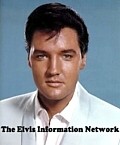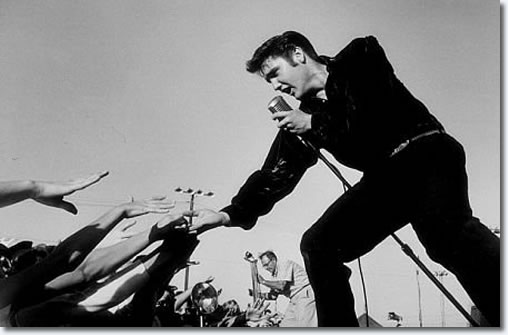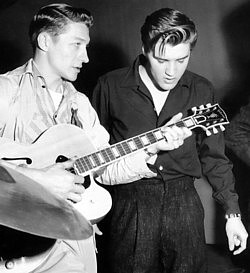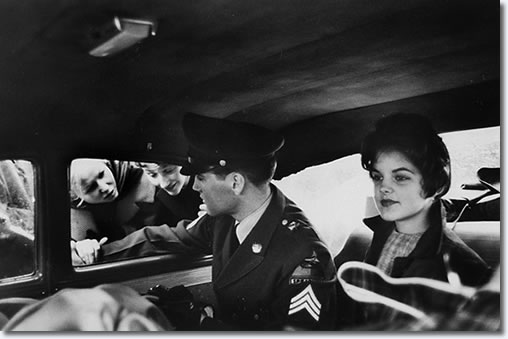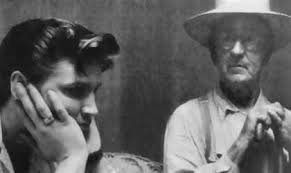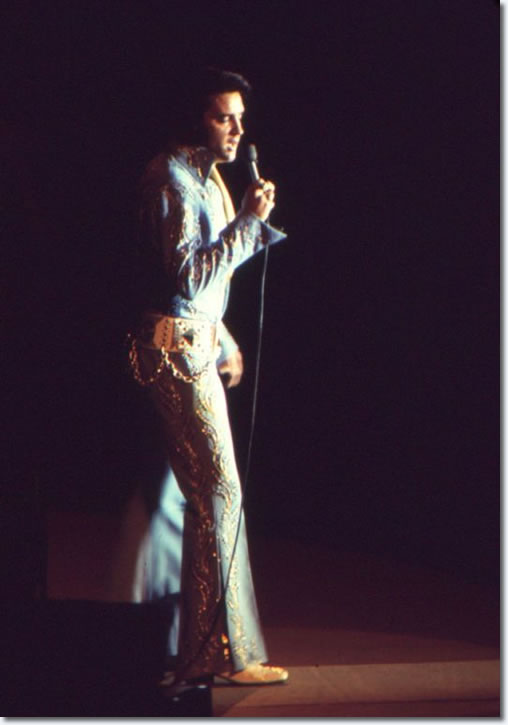 |
 |

Reviewed by Nigel Patterson, December 2014
From the Preface to Elvis Presley: A Southern Life:
Reviewer's Sidebar: Williamson’s 19 page Bibliographic Essay is a key chapter in understanding how he formed his views and themes in writing Elvis Presley: A Southern Life. It is worth reading a number of times to fully appreciate the breadth of his sources and those sources he particularly relied on - for it these that strongly influence, shape and direct the author's thematic analysis and his ultimate interpretation of what they all mean. A basic interrogation of his sources to determine their legitimacy is potentially rewarding. While there is much to admire in Professor Williamson's book there are also moments that challenge its acceptance as a serious academic study. Its central premise is that the influences of the South both created and (eventually) destroyed Elvis. As a book, Elvis Presley: A Southern Life moves briskly, conflating descriptive passages with thematic elements designed to challenge the reader and engender thoughtful reflection on our understanding of the Elvis story. An example of the latter is:
As a writer, the author’s expressive prose evokes a real sense of Elvis’ physical presence:
Williamson is also aware of the importance of dramatic devices to magnify his narrative. His opening chapter The Death of Elvis is an example as it serves to immediately confront the reader and is the first red flag. Not surprisingly, there has been criticism of the graphic detail Williamson offers in discussing Elvis’ death and autopsy. I too was surprised that in a scholarly work which presents as an interpretive treatise about Elvis Presley and what forces , the author adopted such an approach. How does such detail enlighten the reader as to the socio-cultural influences that shaped Elvis? Reviewer's Sidebar: Or is it a case that the commercial reality for authors is that sales of physical books are in decline and if you want to profit from a release its content must include something to entice buyers - although as an academic release from Oxford University Press this shouldn't be a consideration.......should it? Similarly, several reviewers have commented that they don’t believe the author likes Elvis. The cultural and academic snobbery that for a long time dismissed Elvis as being a figure worthy of academic consideration, unfortunately, is still alive in 2014, albeit on a smaller scale than in the past. As noted above, in considering Williamson's attitude to Elvis his Bibliographic Essay is a good starting point for the reader to contemplate the issue. As a scholarly work presenting primary and secondary source material it is not unusual that readers react more strongly to narrative that has a ‘negative’ slant rather than opposing narrative with a ‘positive’ slant. Our inbuilt bias is an interesting phemonenon, particularly given that Elvis Presley: A Southern Life provides many positive accounts of the person that was Elvis Presley. For instance, Williamson, himself a product of the South, records how Steve Binder was ‘surprised and delighted by what he saw as Elvis’ lack of [racial] prejudice’.
However, it is reasonable to observe that, on balance, there is a narrative undercurrent in Elvis Presley: A Southern Life where the author’s choice of word, phrase (and sometimes) narratively rather judgmental (value laden) social snobbery (but not malice), do suggest a negative message about Elvis (or at best provides a mixed message) - for example, consider this passage in relation to Elvis' appearance on the Steve Allen Show:
And it is not just the author who is guilty of this! I was dismayed to read the following passage by Ted Ownby (Professor of History and Southern Studies and Director of the Center for the Study of Southern Culture, University of Mississippi) in his Foreword to Williamson's book:
Ownby's emotively dismissive language construct: "...tried some things that were new, accepted some clothing choices..." presents as a superficial observation which lacks an understanding of Elvis' role in his "comeback" including the choice of his clothing style. Having said this, importantly Ownby highlights a seminal theme in the book......that it suggests the roots of Elvis’ failings lay in the roots of his rise to popularity. This is a theme developed in Williamson’s work and one which deserves proper consideration. Whether one agrees or disagrees with the idea (theory) it is implicitly a strong one. Other issues which have incensed some early readers of Elvis Presley: A Southern Life include Williamson’s portrayal of Elvis as obsessed with sex. In defence of the author, how many males aren’t obsessed with those thoughts at that age? My view is that the significance of Elvis' sexual proclivity is usually overstated. Certainly in the 1950s and for most of the 1960s Elvis is recorded as satisfying a robust sexual appetite. In this respect he is/was no different to other young, or older, adult males provided a similar opportunity to satisfy their hormonal urges – and instructively the stories around Elvis’ sexual escapades are quite conservative and prosaic when compared to those of many other celebrities of his time through to today. And as stated in Elvis Presley: A Southern Life, not all of Elvis' close relationships with women were of a sexual nature (making him no different to most people (male or female) in the mix of his interaction with the opposite sex). Reviewer's sidebar: Undue reliance on several sources including Elvis (Albert Goldman) and Child Bride: The Untold Story of Priscilla Beaulieu Presley (Suzanne Finstad) help explain Willliamson's narrative content, but at the same time urge caution in accepting all of his exposition. While the Goldman and Finstad releases have points of strength, other sources (also consulted by Williamson) such as Peter Guralnick, Ernst Jorgensen and the late Bill E. Burk (Early Elvis trilogy), are long recognised and acclaimed for their consistently high standard of journalistic objectivity and investigative rigour and ostensibly offer better material to draw from. Other books fall into a cloudy middle ground. For instance, memoirs from members of Elvis’ inner circle and those who had a love or physical relationship with him necessarily must be scrutinised given the tendency for books in this genre to be written through rose-colored glasses; as an act of conscious or unconscious revenge; or, due to deliberate selective content and/or the ravages of time and frailties of the human mind, lacking effective research, recollection or historical balance. A problem with relying too heavily on secondary sources is that if you are you using too many it can affect there being a consistent balance in your narrative (as different sources have different perspectives).
Interestingly, based on what those close to Elvis have reported, Williamson underestimates Elvis' understanding of his power over his audience when he comments:
More interesting is Dixie Locke's reaction to what was happening:
'Sex' as a theme in the book takes several forms. On Elvis’ perceived need for a virginal bride, Williamson adds spice to his record:
He continues the virgin theme:
Williamson then surprises by twisting the theme, in thought provoking fashion, and giving it a new dimension:
Elvis and Priscilla in Germany You don’t need to be Einstein or Sigmund Freud to know that sex is one of the core primal drivers of human behaviour. As a basic human need its power over people (in varying degrees) influences how they view and relate to the opposite sex and for some people, Elvis included, how they define themselves. In this context I had no real issue with Professor Williamson’s robust and reinforced account of the issue. I sense that evisceration of the issue certainly wasn’t a possibility. It will be a personal decision whether individual readers consider Elvis Presley: A Southern Life errs in including too much salacious material. Having said that the perspective of some fans on messageboards and online sites such as Amazon.com, is surprisingly puritanical, reflecting views one would expect to read in the 19th rather than the 21st century. It is also material to comment that as has been well recorded, by the 1970s Elvis’ primary interest lay elsewhere, essentially his interest in spiritual, rather than sexual, matters and an accelerating quest to find true meaning in his life. This search occupied an increasing amount of his time when not on stage or in the recording studio. I think it is also true of the majority of people that as we grow older our hormonal urges fade in varying degrees and our needs, be they physical, emotional or spiritual, find a new equilibrium or outlet. Whether you are a global icon or suburban father, life and the relative strength of one’s needs, changes. Reviewer's Sidebar: For the record, in detailing Elvis' sexual exploits Williamson has cited accounts including from Alanna Nash’s fascinating and controversial book, Baby, Let’s Play House and the Women Who Loved Him. Aside from the theme of sexual awakening there are many other points in Elvis Presley: A Southern Life which already have or are likely to elicit debate. I am surprised a number of reviewers have criticised the chapter titles. In my opinion they are a most reasonable collection of the prosaic (you know what you’re getting): Vernon and Gladys (chapter 3) and the evocatively thought provoking: Killers of the Dream (chapter 2). Many readers will take exception to this comment by the author: Albert Goldman’s study of Elvis was published only a few years after Elvis’s death and provides a balanced look at Elvis’s entire life.In addition, Williamson comments that Suzanne Finstad’s Child Bride is “thoroughly researched”. At the heart of Finstad's book are the inflammatory claims of Currie Grant, a person many consider to be of dubious character. On the subject of the Presley’s attendance at the Assembly of God church the author presents the common description of a revivalist denomination with singing, shouting and exaltations of “praise the lord”. In ascribing its influence on the young Elvis it is worth noting that while many early texts on the Elvis story suggested the Presley’s attended church regularly, other (later) texts have suggested they were not regular church goers. Williamson also argues that Elvis would at an early age understand that he was born into the lower orders of society. I can accept this view, but he takes it further and suggests that Elvis “...must have known that even in the Presley and Smith clans his father stood near or at the bottom.” While Williamson convincingly makes the case for Vernon’s weaknesses, I do not consider he makes a strongly enough reasoned case for this statement. A strength of Williamson's narrative is his attention to the interplay between race, culture and a straightlaced Southern society during the time Elvis grew from infant to vulgar hillbilly performer to the King of Rock ‘n’ Roll. We are all shaped by influences around us, especially during our formative years. For Elvis, he grew up in an unsettled post-depression era where the seeds of great socio-economic changes were nurtured, albeit in an often highly volatile societal cauldron characterised by seminal racial and cultural tensions. Williamson’s ability to integrate these often disparate elements and give them coherence and color as instrumental influences on Elvis’ growth as a person, is impressive. Similarly, there is a strong expression of the contradiction that was Elvis - a respectful, soft spoken young man, but one with a flamboyant dress sense who wiggled his hips provocatively.
While Elvis Presley: A Southern Life is essentially written as a serious, academic study of its subject, it does include light-hearted moments. How Ginger Alden’s sister, Terry, lost her chance with Elvis will bring a smile to many a reader's face! Consequent on its sources, many of the stories told in Elvis Presley: A Southern Life are, by themselves, not new. What is original is Williamson’s interpretation of what they mean in the Elvis Presley story. Williamson's perspective gains its gravitas by the way he has skilfully taken the jumbled fragments of the mosaic which make up Elvis’ life and sorted them into a coherent and generally plausible (if at times flawed) socio-cultural explanation of how Elvis became Elvis Presley and how the forces that affected his life offered him power and success, but ultimately also contributed to his sad demise. As a prisoner of his personal psychology and the socio-cultural characteristics of the deep South Elvis attained his success on one plane only.......his success inadequate to deliver him the experience of ascending the Southern class ladder. Elvis Presley: A Southern Life has greatest resonance to its core themes in its first half. Its second stanza is more concerned with the destructive impact of excesses and insecurity on Elvis and his growing inability to function as a reasonably normal human being. Some readers will find accounts of changes in Elvis' behaviour and his treatment of others to be biased or overstated but undoubtedly there is an unpleasant truth to them - a truth that needs to be considered within Professor Williamson's basic premise of Southern influences creating Elvis' ascendancy and demise.
To me the greatest weaknesses of Elvis Presley: A Southern Life is that its interesting and thought provoking narrative lacks balance, in some cases uncritical acceptance of particular secondary sources which have met with criticism, and at times betrays the requisite quality of non-tabloid reporting which should characterise an academic publication. It is the book's (at times) emphasis on titillating themes and a lack of the author actually discovering the 'real Elvis', of giving the reader a proper sense of what Elvis was feeling, and importantly of reporting on what Elvis is best known for.......his music, that is unsettling. Given the central position music plays in the Elvis story it is most surprising to note its scarcity in the book. It seems to me that the rich musical history of the South, which in one seminal sense moulded Elvis, is a perfect fit for the socio-cultural framework Williamson uses to interpret and tell his story. As with virtually all books there is the odd error in Elvis Presley: A Southern Life. For example, Alanna Nash won’t be happy to see authorship of her excellent work, Elvis Aaron Presley: Revelations of the Memphis Mafia, attributed (on one occasion) to Steve Dunleavy (author, with members of Elvis’ Memphis Mafia, of the infamous 1977 “Bodyguard book”, Elvis: What Happened?) The book includes a 16 page b&w photo section with several rare images. Verdict: Elvis Presley: A Southern Life is the latest of many academic or intellectually based books about Elvis. Its importance lies in asking the reader to contemplate its titular protagonist through a more culturally aware lens which argues a case that puissant elements peculiar to the Southern states of the USA not only shaped Elvis' success but also his downfall.
Professor Williamson's themes (and emphasis) have already created a level of dissonance and divided fans - in this context (and to his defence) it should be observed that a fundamental construct of academic publications is to argue a position based on structured research and elicit debate on the topic. It is not a case of whether you agree or disagree with the author.......the author's primary intent is to make you think, question and reevaluate the subject matter.......in this case, the what and why of who Elvis was. On this level Elvis Presley: A Southern Life not only succeeds, but succeeds particularly well. In addition, as is key to any good research the author offers a perspective which improves the reader's understanding of the subject. While Elvis Presley: A Southern Life is not without weaknesses (some would say biases) and, in my opinion is overly sensationalist at times and lacks balance, it is nevertheless an intriguingly complex and thought provoking interpretation of the Elvis Presley story which is one of the best Elvis books of 2014 and well worth reading. FeedbackPaul Larsen (writer of foreword for book "Born To Rock" published by Bud Glass): Excellent review. Seems the author of the book reviewed would have benefited from the reviewer’s balanced writing. Bottom line: If Elvis’ music is hardly dealt with, the book loses all validity to me….for Elvis lived to make music and was a genius at doing so. What a gift that music was to all of us. James Frawley: Top review of the Southern Life book. Tim Smith: I enjoyed your thorough review of the book. I was hoping the book would be worth reading but early reports suggested it was going to be trashy and reading your review pretty much confirms that for me. Jenny: I am reading A Southern Life and have to agree with you that parts of it are sensational when they don't need to be. I was born in Nashville and I am enjoying the book so far in what Dr Williamson says about Elvis's southern roots and how it affected him.
EIN Website content © Copyright the Elvis Information Network.
|
|
